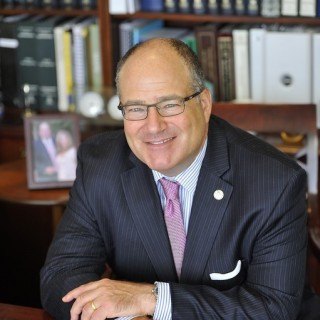
Mark R. Osherow
Together we can meet the challenge. Lawyers and Advisors.
Mark R. Osherow is a Florida Bar Board Certified Specialist in Business Litigation with nearly 30 years of experience. He has practiced for the majority of those years in both state and federal courts throughout Florida. With significant trial and alternative dispute resolution experience, Osherow has taken countless depositions ans served as first-chair in numerous trials, arbitrations and mediations. He serves as a legal advisor for his clients as they assess their business risks across a large segment of industry and service providers.
Mr. Osherow was recently selected by his peers for inclusion in The Best Lawyers in America for 2018 in the field of Business Litigation. This is the fifth year in a row that Mr. Osherow has achieved this recognition. Mr. Osherow has also been included in the listing of the 2017 Top 100 Miami Area Super Lawyers.
His practice encompasses a wide range of business and commercial litigation matters in a variety of areas, including trade secret and non-compete litigation, real estate, construction, fraud, business torts, securities, labor and employment, professional liability, and corporate, partnership and bankruptcy-related disputes.
He is also well-versed in probate litigation and other matters related to estate planning and trusts. Osherow’s experience also includes consumer protection and class actions, products liability, actions involving judicial dissolution of corporate entities and partnerships, insurance coverage and ERISA benefits litigation issues.
Osherow is well versed in federal practice, having handled cases involving Title VII, Section 1983, FLSA, ADA, FMLA Computer Fraud and Abuse (CFAA), and claims under many other state and federal employment related statutes, as well as claims involving many sorts of governmental liability claims. He has substantial experience with class action litigation particularly in the areas of consumer fraud class actions and collective actions under the FLSA.
- Business Law
- Business Contracts, Business Dissolution, Business Finance, Business Formation, Business Litigation, Franchising, Mergers & Acquisitions, Partnership & Shareholder Disputes
- Real Estate Law
- Commercial Real Estate, Condominiums, Easements, Eminent Domain, Homeowners Association, Land Use & Zoning, Mortgages, Neighbor Disputes, Residential Real Estate, Water Law
- Construction Law
- Construction Contracts, Construction Defects, Construction Liens, Construction Litigation
- Employment Law
- Employee Benefits, Employment Contracts, Employment Discrimination, ERISA, Overtime & Unpaid Wages, Sexual Harassment, Whistleblower, Wrongful Termination
- Intellectual Property
- Arbitration & Mediation
- Business - Arbitration/Mediation, Consumer - Arbitration/Mediation, Family - Arbitration/Mediation
- Probate
- Probate Administration, Probate Litigation, Will Contests
- Consumer Law
- Class Action, Lemon Law
- Securities Law
- Stockbroker & Investment Fraud
- Insurance Claims
- Bad Faith Insurance, Business Insurance, Disability Insurance, Health Insurance, Life Insurance, Motor Vehicle Insurance, Property Insurance
- Business Litigation
- Commercial Litigation
- EDiscovery
- Free Consultation
- Credit Cards Accepted
-
Contingent Fees
Selected matters only; partial contingencies available in selected matters. -
Rates, Retainers and Additional Information
Available upon request.
- Connecticut
-

- Florida
-

- New Jersey
-

- New York
-

- 11th Circuit
-

- English
- Managing Member/Partner
- Osherow, PLLC
- - Current
- Of Counsel
- Broad and Cassell
- -
- Partner
- Katz Barron
- -
- Yeshiva University
- J.D. (1988) | Law
- -
-

- University of Pennsylvania
- B.A. (1985) | Liberal Arts
- -
-

- Top 5% of Florida Lawyers
- Super Lawyers
- Top 5% of Florida Lawyers
- Super Lawyers
- Top 5% of Florida Lawyers
- Super Lawyers
- Top 5% of Florida Lawyers
- Super Lawyers
- Top Up and Comer
- South Florida Legal Guide
- Broward County Bar Assocaition
- Member, Bench Bar Conference Committee
- - Current
-

- The Florida Bar
- Member, Business Litigation Certification Committee
- - Current
-

- South Palm Beach County Bar Association
- Director
- - Current
-

- New York State Bar # 2257525
- Member
- - Current
-

- Florida Medical Malpractice and the Statute of Limitations
- The Florida Bar Journal
- Counsel Beware: Considerations Before Implementing Florida’s Civil Theft Statute
- The Florida Bar Journa;
- Recent Amendments to the Summary Judgment and Directed Verdict Standard in Florida Sea Change or Minor Dent?, Zoom
- South Palm Beach County Bar Association
- In a late December 2021 ruling, the Florida Supreme Court adopted the federal summary judgment standard (subject to a proper rule amendment). The Florida Supreme Court, on its own motion, amended Florida Rule of Civil Procedure 1.510(c) effective May 1, 2021, expressly adopting the summary judgment standard articulated by the U.S. Supreme Court in Celotex Corp. v. Catrett, 477 U.S. 317 (1986). In re Amendments to Fla. Rule of Civ. Procedure 1.510., 2020 Fla. LEXIS 2148 (Fla. Dec. 31, 2020).
- Florida Bar Board Certified Specialist in Business Litigation
- The Florida Bar
- Board Certified Specialist in Business Litigation
- The Florida Bar
- Q. What criteria needs to be met for a defamation of character lawsuit?
- A: You should consider immediately demanding a retraction and that the information be removed.
A common law claim for defamation requires the unprivileged publication (to a third party) of a false and defamatory statement concerning another, with fault amounting to at least negligence on behalf of the publisher, with damage ensuing. Thomas v. Jacksonville Television, Inc., 699 So.2d 800 (Fla. 1st DCA 1997). A communication is “defamatory” if it tends to harm the reputation of another as to lower him or her in estimation of community or deter third persons from associating or dealing with the defamed party. Id. at 803. Defamation actions often raise Constitutional concerns and First Amendment ... Read More
- Q. Personal representative for deceased relative
- A: Florida Statues Section 733.302:
Who may be appointed personal representative.—Subject to the limitations in this part, any person who is sui juris and is a resident of Florida at the time of the death of the person whose estate is to be administered is qualified to act as personal representative in Florida.
The Probate Code gives preference in the appointment of a personal representative in the event of either testate or intestate estates. For an estate with a valid will, preference is given to the personal representative named in the will, or a person selected by a majority of interested persons, or a devisee of the decedent. Under Florida Statute § 733.301, for estates without ... Read More
- Q. Is it possible to create only one original contract copy by executing in counterpart?
- A: Interesting question. If the contract says it can be executed in counterparts it can be signed on separate documents. Probably would be valid if executed like that even without specifically so stating. Technically, each of the signed originals in full when placed together would be the original. If the separate pages are initialed then they should be included. Frequently, one of the parties adds all the signature pages and creates a separate original draft containing all of the signatures and then circulates that as the final executed draft. If there is any doubt, include all of the pages from each signed original.

 Meet Mark Osherow and Kenyetta Alexander Attorneys at Osherow PLLC
Meet Mark Osherow and Kenyetta Alexander Attorneys at Osherow PLLC
